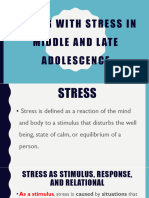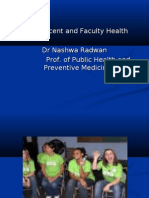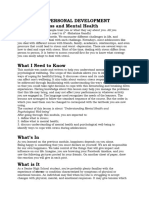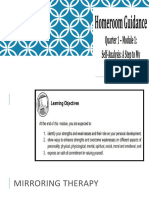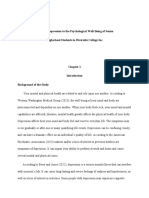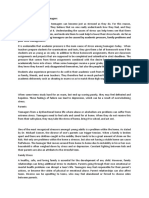0 ratings0% found this document useful (0 votes)
29 viewsCoping With Stress in The Middle and Late
Coping With Stress in The Middle and Late
Uploaded by
Raymond Jay TambongThe document discusses stress in adolescence and provides strategies for coping with stress. It defines stress and notes that moderate, short-term stress can be beneficial while prolonged stress is unhealthy. Common stressors for adolescents include academic pressures, relationships, health issues, and peer/family expectations. The document recommends identifying stressors and checking one's physical and emotional reactions to stress. It emphasizes the importance of coping strategies like problem-focused or emotion-focused approaches to deal with stress in a healthy way and avoid psychological harm.
Copyright:
© All Rights Reserved
Available Formats
Download as PPTX, PDF, TXT or read online from Scribd
Coping With Stress in The Middle and Late
Coping With Stress in The Middle and Late
Uploaded by
Raymond Jay Tambong0 ratings0% found this document useful (0 votes)
29 views19 pagesThe document discusses stress in adolescence and provides strategies for coping with stress. It defines stress and notes that moderate, short-term stress can be beneficial while prolonged stress is unhealthy. Common stressors for adolescents include academic pressures, relationships, health issues, and peer/family expectations. The document recommends identifying stressors and checking one's physical and emotional reactions to stress. It emphasizes the importance of coping strategies like problem-focused or emotion-focused approaches to deal with stress in a healthy way and avoid psychological harm.
Original Title
COPING WITH STRESS IN THE MIDDLE AND LATE
Copyright
© © All Rights Reserved
Available Formats
PPTX, PDF, TXT or read online from Scribd
Share this document
Did you find this document useful?
Is this content inappropriate?
The document discusses stress in adolescence and provides strategies for coping with stress. It defines stress and notes that moderate, short-term stress can be beneficial while prolonged stress is unhealthy. Common stressors for adolescents include academic pressures, relationships, health issues, and peer/family expectations. The document recommends identifying stressors and checking one's physical and emotional reactions to stress. It emphasizes the importance of coping strategies like problem-focused or emotion-focused approaches to deal with stress in a healthy way and avoid psychological harm.
Copyright:
© All Rights Reserved
Available Formats
Download as PPTX, PDF, TXT or read online from Scribd
Download as pptx, pdf, or txt
0 ratings0% found this document useful (0 votes)
29 views19 pagesCoping With Stress in The Middle and Late
Coping With Stress in The Middle and Late
Uploaded by
Raymond Jay TambongThe document discusses stress in adolescence and provides strategies for coping with stress. It defines stress and notes that moderate, short-term stress can be beneficial while prolonged stress is unhealthy. Common stressors for adolescents include academic pressures, relationships, health issues, and peer/family expectations. The document recommends identifying stressors and checking one's physical and emotional reactions to stress. It emphasizes the importance of coping strategies like problem-focused or emotion-focused approaches to deal with stress in a healthy way and avoid psychological harm.
Copyright:
© All Rights Reserved
Available Formats
Download as PPTX, PDF, TXT or read online from Scribd
Download as pptx, pdf, or txt
You are on page 1of 19
COPING WITH STRESS
IN THE MIDDLE AND
LATE ADOLESCENCE
STRESS:
- Is the reaction of the mind and body to a
stimulus that disturbs the well being, state
of calm of a person.
- Stress may be both good & bad,
depending on the length of time it persists.
Common belief:
Stress is unhealthy but discussions among
experts conclude that this is not entirely
the case.
Psychologist have agreed that a small &
noncontinuous amounts of stress can be
helpful & beneficial to individuals while
excessive amounts of stress sustained
over a lengthy period of time can be
destructive to both physical and mental
health.
SEVERAL POINTS TO VIEW STRESS:
Stress as Stimulus, Response and
Relational
As a Stimulus – stress is caused by situations that
may be life threatening or life changing such as
separation, moving into a new home or having a
new job. These situations or events are often called
stressors.
- stress may be the events or situations that are life
changing and very challenging.
Stress as a response – is the way the body reacts to
challenging situations.
- stress causes the body and the brain to secrete
hormones and chemicals that are manifested
physically & which may drive a person to a certain
behavioral direction in dealing with the stress.
Stress as relational – stress is seen as a situation that a
person interacts with.
- the person can assess whether the situation is
relevant or not & if the relevance is positive or negative.
-is when a person experiencing stress takes a step
back to look at the situation that is causing the stress &
assesses it.
- if the relevance is positive, the person will look at
the situation as a challenge, can change the effect of the
situation & then take a necessary course of action to
lessen the stress. if the relevance is negative, the person
will develop negative emotions, which will aggravate
the stressful situation even more.
Example: A flight delay. A positive relevance to this
will have the person thinking this is one situation he
has no control of, & there may be a purpose or
reason why it is happening. A negative relevance
will produce agitation & impatience, blaming the
airline or whoever is responsible for the delay,
which may result in lost of opportunities.
Healthy Stress:
- Stress that is short & sporadic can motivate,
energize & spur an individual into fruitful action.
Ex. Speaking in front of the audience is a healthy type of
stress as it pushes the speaker to prepare & be an
effective speaker.
-stage performers are also under stress while performing
& this same stress my bring out their best performances.
-competing in sports. Healthy stress can propel the
competing individual to perform better.
Bad stress can be transformed into good stress depending
on how an individual assesses the situation. Adolescent
students, who are in constant stressful situations
particularly related to school-work & relationships,
should learn some coping mechanisms to assist them in
their development toward a healthy adult life.
Know your Stressors:
2 sources of stressors:
1. External stressors – are those that come from
outside of you like situations, people &
experiences.
2. Internal Stressors – are those coming from within
you, like thoughts that you have that caused you to
feel fearful, uncertainties about the future, lack of
control over situations and even your personal
beliefs, which include your own expectations.
Samples of Possible Stressors:
School Demands & Expectations
Quizzes & tests, home works & projects, oral
recitation, quarterly & final exams and grade most
especially, epitomize the kind of stressors
adolescents have when it comes to studying.
Although grades are not the only gauge of what one
has learned, it is what the educational system relies
on when trying to measure one’s learning capacity.
Graduating senior high school students feel the
stress more than any other year level. The question
that lingers on their minds is whether one will
graduate on time or not.
Is it not that senior high school students are
expected to graduate like all the rest? Apparently,
academic failure to most students is never an option.
How can one cope with this?
Selecting a School, College Course or Career
Related to the first stressor mentioned is the
situation of what will happen after graduation. A high
school students who just graduated faces more
demanding challenges and the first of these are the
entrance examination. Oftentimes, fresh graduates
have gone through several aptitude tests conducted in
high school to help them define what their interests are
& what probable college course fits their interests.
Unfortunately, there is need for more relevant
information describing the kinds of jobs that are available
to college graduates. This is another reason why high
school graduates also go through a guessing game as to
where & what they will end up doing after college.
Separation Anxiety
High school graduation, to some means a temporary
ending or separation from some of their friends. There is
a possible scenario that a best friend might move to
another place to study or move to another school.
Technology might ease the pain of separation by simply
going online, texting or calling to get instant connection
with someone who is sorely missed.
College Life
The prospect of being by themselves in a new
school in college and meeting & adjusting to new
people is another cause of stress fro graduating senior
students. The unfamiliarity of a new environment can
bring stress to adolescents as they set their foot in
college.
Romantic Relationships or the lack of it
Adolescents have a tendency to feel awkward when
they are not in a special relationship with someone.
Somehow, having an intimate relationship is a status
symbol that says one is good looking, interesting and
attractive.
Family Demands and Expectations
To some adolescents, family ties can be a stressor. The
adolescent is still learning & yearning for independence&
autonomy, but parents may not be ready to relinquish control
over their “baby”. This is why conflict sets in.
There si also rebellion in the mind of adolescents, to go
against the norm & and to set their own norms that may not
be agreeable to the parents.
There are still some parents who think they know better
than their children & so they decide for them on critical
issues. An example is what course to take in college. Parents
who believe that there is no future in music or designing
career can overrule a highly creative and sensitive adolescent
who may wish to take up music or designing arts.
Encouragement to take up another course, like the
one that may be similar to one or both parents, for
example, medicine, usually happens.
Parental expectations are difficult to meet, especially
if these counter one’s self-identity. What options does
an adolescent have in dealing with this?
Health Concerns
To some adolescents, health maybe a problem.
Health problems may run a gamut or varieties, such as
unwanted pregnancy, HIV & other sexually transmitted
diseases, unhealthy lifestyles such as poor eating &
sleeping habits that often lead to lifetime diseases and
so on.
Demands for Social Life
There is a common thinking among adolescents
that it is embarrassing to be alone. That is why the
need to belong is significantly important for
adolescents.
Forming groups or joining one makes an
adolescent feel safe & secure because to belong to a
social group is an affirmation that they are
acceptable to others. But how does one become a
part of a social group?
In order to become a part of a group, the
individual has to have common interests with the
other members of the group like being in the honor’s
list or having common extra curricular interests such
as acting, singing, dancing or sports. In some cases,
stressful group pressure sets in when an individual is
faced with the challenge to belong & be part of the
group by going through some form of ritual, like
experimenting with drugs or alcohol, or even with
sex. An adolescent with a strong self-concept & self –
esteem should be able to discern what is good for
them when selecting their group.
Bullying
Being bullied in school can be very stressful & may
cause emotional & psychological trauma to the
individual experiencing it. Many schools are aware of
the presence of bullying & have policies dealing with it.
If you are being bullied, either physically or verbally,
report this to your teacher, the school principal & your
parents. Some individuals learn to deal with bullying by
fighting back with the right attitude & the right words.
Bullies are around because it is often believed that they
have problems either at home or with themselves & also
need empathy & understanding.
Coping with stress:
By now you have learned that stress can either be
good or bad, depending on how this is affecting you &
how you are allowing it to affect you.
What is important is to know what stresses you &
identifying your stress situations or stressors. Once you
have identified these, check yourself & see how you
are reacting or relating to the stressor.
Is your body tense? Are you sleepless?
It is important to acknowledge these reactions & any
feelings or emotions that arise within you. Avoid going
into denial by saying you are okay when you are really
not.
Coping is a very important mechanism in dealing
with stress.
- it is way for a person to deal with stress in a
healthy, acceptable manner.
- it is necessary to avoid psychological trauma &
mental diseases. It can be a problem-focused, by
dealing with the problem & finding ways to solve it
or avert further stress;
or emotion-focused, by lessening the emotional
impact of stress through positive imagery or
thoughts.
You might also like
- Healers On HealingDocument5 pagesHealers On Healingmario100% (2)
- Understanding The SelfDocument4 pagesUnderstanding The SelfMary Joy Pelaez100% (1)
- Basic Personality Inventory Scale DescriptionsDocument3 pagesBasic Personality Inventory Scale Descriptionslouie roderos100% (1)
- Your Character Strengths ProfileDocument3 pagesYour Character Strengths ProfileEricka AbigailNo ratings yet
- Identifying Emotions: Step 1: Read Through The List of Emotions Below. Highlight or Underline Any Emotions That YouDocument3 pagesIdentifying Emotions: Step 1: Read Through The List of Emotions Below. Highlight or Underline Any Emotions That YouSpongeBobLongPantsNo ratings yet
- Research Paper: How Using Art Making As A Coaching Tool Supports Client LearningDocument12 pagesResearch Paper: How Using Art Making As A Coaching Tool Supports Client LearningInternational Coach AcademyNo ratings yet
- David Rapaport - Emotions and MemoryDocument305 pagesDavid Rapaport - Emotions and Memorymanutoutcourt83% (6)
- PerDev Group2Document13 pagesPerDev Group2Danna Jean TambigaNo ratings yet
- Green Vintage Group Project PresentationDocument30 pagesGreen Vintage Group Project Presentationm8695791No ratings yet
- StressDocument34 pagesStressJayward Babaran BayugNo ratings yet
- PERDEVDocument25 pagesPERDEVjonalynmiranda123022No ratings yet
- StressDocument24 pagesStressneilpatrickfuentes5No ratings yet
- Chapter 6.COPING STRESS - JTMDocument3 pagesChapter 6.COPING STRESS - JTMjonalynmiranda123022No ratings yet
- Devcomm Stress ManagementDocument7 pagesDevcomm Stress ManagementGregy Joe BatinNo ratings yet
- CHAPTER 6 DEFINING STRESS PERSONAL DEVELOPMENTDocument33 pagesCHAPTER 6 DEFINING STRESS PERSONAL DEVELOPMENTarlyn.deleon010No ratings yet
- G2 Defining StressDocument34 pagesG2 Defining StressAriam SorepsinNo ratings yet
- Perdev Module6Document13 pagesPerdev Module6CJ Moises03No ratings yet
- Week 5 PerDevDocument13 pagesWeek 5 PerDevAlt GakeNo ratings yet
- UntitledDocument11 pagesUntitledTalk2us BPONo ratings yet
- Coping With Stress in Middle and Late AdolescenceDocument42 pagesCoping With Stress in Middle and Late AdolescenceBAYA, ZSEANNEL RAIVEN V.No ratings yet
- Thesis Amira Chapter 1-3Document17 pagesThesis Amira Chapter 1-3Amira PalatinoNo ratings yet
- The Challenges of Middle and Late Adolescence 1Document25 pagesThe Challenges of Middle and Late Adolescence 1GHIEKITANENo ratings yet
- We All Live With StressDocument5 pagesWe All Live With Stress려준평No ratings yet
- Chapter 6 Coping With Stress in Middle and Late AdolescenceDocument28 pagesChapter 6 Coping With Stress in Middle and Late Adolescence2023800116No ratings yet
- FINAL EXAM English Composition 212Document5 pagesFINAL EXAM English Composition 212Ma Carmela Bido AlceraNo ratings yet
- Final ResearchDocument55 pagesFinal Researchjaneldelosreyes321No ratings yet
- 2nd ModuleDocument3 pages2nd Modulefern suenoNo ratings yet
- Perdev - Module5 (Week5)Document9 pagesPerdev - Module5 (Week5)JM Favis CortezaNo ratings yet
- During Middle AdolescenceDocument2 pagesDuring Middle AdolescenceroxasruielNo ratings yet
- Personal-Development 4Document5 pagesPersonal-Development 4Carl Angelo MartinNo ratings yet
- Youth Stress EssayDocument3 pagesYouth Stress EssayGemma100% (1)
- Week 1 and 2 - Health 3rd QDocument9 pagesWeek 1 and 2 - Health 3rd QJANEL BRIÑOSANo ratings yet
- Causes of StressDocument2 pagesCauses of StressDhanamalar VeerasimanNo ratings yet
- The Stress Associated With Being A StudentDocument24 pagesThe Stress Associated With Being A Studenttamanna1333% (3)
- Chapter 5Document3 pagesChapter 5Dana Andrea MendiolaNo ratings yet
- Week 4 PerDevDocument26 pagesWeek 4 PerDevAlt Gake100% (1)
- Lecture - Mental and Emotional HealthDocument5 pagesLecture - Mental and Emotional HealthRogerson PenaNo ratings yet
- PERDEVDocument4 pagesPERDEVKristelNo ratings yet
- Stress in Children and Adolescents: Tips For Parents: From Your School PsychologistDocument2 pagesStress in Children and Adolescents: Tips For Parents: From Your School PsychologistAsri Lazi AminNo ratings yet
- Chapter IDocument9 pagesChapter ILea MartinezNo ratings yet
- Homework Leads To DepressionDocument4 pagesHomework Leads To Depressionafnadjvaaeivhp100% (1)
- Adolescent and Faculty HealthDocument59 pagesAdolescent and Faculty Healthapi-19712253No ratings yet
- Project Work of HRMDocument33 pagesProject Work of HRMbhargavi mishraNo ratings yet
- Blog - Teen Mental Health in IndiaDocument4 pagesBlog - Teen Mental Health in IndiaKarthik GutthaNo ratings yet
- Stress Management in TeensDocument15 pagesStress Management in TeensKanishka TalrejaNo ratings yet
- 2.1 Stress and Mental HealthDocument5 pages2.1 Stress and Mental HealthMatt Andrie B. DagtingNo ratings yet
- Homeroom GuidanceDocument32 pagesHomeroom GuidancesheilaNo ratings yet
- Coping With Stress in Middle and Late AdolescenceDocument18 pagesCoping With Stress in Middle and Late AdolescenceSophia Indirah MamalubaNo ratings yet
- Laurence's Life Orientation ProjectDocument5 pagesLaurence's Life Orientation Projectvibesjust826No ratings yet
- Depression Among College StudentsDocument17 pagesDepression Among College StudentsEqui TinNo ratings yet
- Lesson 2 (1)Document32 pagesLesson 2 (1)kintaximaNo ratings yet
- Stress Is A Common Problem Among University Students. Discuss. Support Your Answer With Examples. Give Your Views in Not Fewer That 350 WordsDocument1 pageStress Is A Common Problem Among University Students. Discuss. Support Your Answer With Examples. Give Your Views in Not Fewer That 350 WordsAzriAzharNo ratings yet
- Adolesent Challenges AND EXCEPTIONAL KNOWLDEGE ON DEVELOPMENTDocument13 pagesAdolesent Challenges AND EXCEPTIONAL KNOWLDEGE ON DEVELOPMENTalexlugalia7No ratings yet
- Self-Awareness and EsteemDocument5 pagesSelf-Awareness and EsteemkalasingayvonneNo ratings yet
- College Anxiety: How To Help An Anxious Student Transition SuccessfullyDocument5 pagesCollege Anxiety: How To Help An Anxious Student Transition SuccessfullybelbachirNo ratings yet
- Assisting The Emotionally Distressed StudentDocument22 pagesAssisting The Emotionally Distressed StudentSinziana BulgaruNo ratings yet
- Sample 3Document9 pagesSample 3Ivy May Geanga SarabiaNo ratings yet
- The Influence of Trauma in Learner Group 8Document6 pagesThe Influence of Trauma in Learner Group 8ANDRADE ANABELLE, ANo ratings yet
- SYNOPSISDocument17 pagesSYNOPSISirummnadeemNo ratings yet
- Causes of Stress Among TeenagersDocument4 pagesCauses of Stress Among TeenagersParimalar RathinasamyNo ratings yet
- 2017CS10324 Assignment 1Document7 pages2017CS10324 Assignment 1Amal PrasadNo ratings yet
- Teen Stress and ManagementDocument2 pagesTeen Stress and Managementduna.bokhariNo ratings yet
- 4-Coping-Up-with-StressDocument7 pages4-Coping-Up-with-StressdeniellesampongNo ratings yet
- Arma_ManuscriptDocument2 pagesArma_ManuscriptanthonyocenararmaNo ratings yet
- Benefits of Dance and Creative MovementDocument8 pagesBenefits of Dance and Creative MovementRaymond Jay TambongNo ratings yet
- g-12 sACRAMENTSDocument16 pagesg-12 sACRAMENTSRaymond Jay TambongNo ratings yet
- Dance Appreciation &Document11 pagesDance Appreciation &Raymond Jay TambongNo ratings yet
- Names of EnvelopeDocument8 pagesNames of EnvelopeRaymond Jay TambongNo ratings yet
- All My LifeDocument1 pageAll My LifeRaymond Jay TambongNo ratings yet
- Pattern of DevelopmentDocument19 pagesPattern of DevelopmentRaymond Jay TambongNo ratings yet
- ProjectDocument1 pageProjectRaymond Jay TambongNo ratings yet
- Research ReportDocument17 pagesResearch ReportRaymond Jay TambongNo ratings yet
- Organisation Behavior Mind MappingDocument12 pagesOrganisation Behavior Mind Mappingghada kotb0% (1)
- Jelo SunidoDocument2 pagesJelo SunidoJelo sunidoNo ratings yet
- Anthropological FoundationDocument32 pagesAnthropological FoundationCharina May NolanNo ratings yet
- Art Therapy Education PDFDocument11 pagesArt Therapy Education PDFmelpomena81No ratings yet
- ROLE OF SPIRITUALITY IN ATTAINING WELLBEING - Final Version After Changes PDFDocument24 pagesROLE OF SPIRITUALITY IN ATTAINING WELLBEING - Final Version After Changes PDFKiran Kumar SalagameNo ratings yet
- Anxiety Depression StressDocument21 pagesAnxiety Depression StressMaybel BaraquielNo ratings yet
- The Psychological Factors Affecting Physical HealthDocument10 pagesThe Psychological Factors Affecting Physical Healthstoneage989100% (1)
- Emotionally Focused Therapy For Couples and Childhood Sexual Abuse SurvivorsDocument19 pagesEmotionally Focused Therapy For Couples and Childhood Sexual Abuse SurvivorsEFTcouplesNo ratings yet
- Free Wealth Keys Program EbookDocument39 pagesFree Wealth Keys Program Ebookapi-106037535100% (2)
- Assignment 3 Carl JungDocument7 pagesAssignment 3 Carl JungKendrew SujideNo ratings yet
- Act Substance Abuse TreatmentDocument27 pagesAct Substance Abuse TreatmentnicoletaNo ratings yet
- General Psychology: School of Social Sciences Indira Gandhi National Open UniversityDocument38 pagesGeneral Psychology: School of Social Sciences Indira Gandhi National Open UniversitySunainaNo ratings yet
- David Hume - ppt2Document22 pagesDavid Hume - ppt2M Bilal SaeedNo ratings yet
- Approaches To Counselling: by Amala Mary JohnyDocument22 pagesApproaches To Counselling: by Amala Mary Johnyammu2805No ratings yet
- Being The SolutionDocument46 pagesBeing The Solutionsheelam54761No ratings yet
- Whoqol BrefDocument5 pagesWhoqol BrefLynn Morrison WilliamsNo ratings yet
- Developing Self Compassion As A Resource For Coping With Hardship: Exploring The Potential of Compassion Focused TherapyDocument14 pagesDeveloping Self Compassion As A Resource For Coping With Hardship: Exploring The Potential of Compassion Focused TherapyShandy PutraNo ratings yet
- Clarity+Journal+by+Michele+Lee +a++tDocument18 pagesClarity+Journal+by+Michele+Lee +a++tIrene MartínNo ratings yet
- HJPlev 6Document66 pagesHJPlev 6Mozis PetiNo ratings yet
- Plato's ViewDocument26 pagesPlato's ViewChristine Erica Fernandez100% (1)
- Karlsson ExperiencesGuiltShame 2009Document22 pagesKarlsson ExperiencesGuiltShame 2009sudarshan pandeyNo ratings yet
- The Science and Practice of Yoga - UTArlingtonXDocument8 pagesThe Science and Practice of Yoga - UTArlingtonXSorinel BalanNo ratings yet
- Child and Adolescent Learning: Home Help PreferencesDocument19 pagesChild and Adolescent Learning: Home Help Preferencesmark ceasarNo ratings yet























